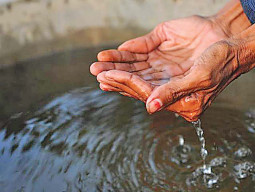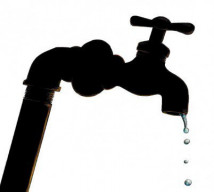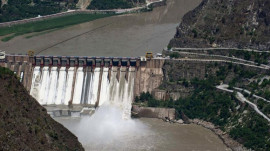
HYDERABAD: The water filtration plant in Mirpurkhas has been using 12-year-old chlorine, which was then provided by the United Nations International Children’s Emergency Fund (Unicef), to kill bacteria.
The disclosure was made by Jawad Zahoor, the incharge of water supply, before the Sindh High Court’s (SHC) judicial commission on water, which conducted hearing in the Mirpurkhas district and sessions court on Wednesday.
“… 12 years back, chlorine was provided by Unicef, which [the] municipal committee has been using over the years to chlorinate the water,” Zahoor informed the single-judge commission, headed by Justice Muhammad Iqbal Kalhoro.
He told the commission that he assumed the charge in 2009 and was given 100 packs of chlorine by the previous incharge, claiming that he has been managing with that scant supply ever since.
According to deputy commissioner Mehdi Ali Shah, 1.5 million people live in the district among whom, around 330,000 live in Mirpurkhas city. They are supplied drinking water through two filtration plants, which carry water from East Jamrao and West Jamrao canals. Two other plants in the district are defunct.
The water expert, Dr Ahsan Siddiqui, who is assisting the commission, told The Express Tribune that chlorine loses its power to kill bacteria and other microbes from drinking water if exposed to moisture or open environment. “The bleachability of 12 years [old] chlorine may have reduced to around 10% or may be two to three per cent.”
The judge also visited East Jamrao filter plant. “… the claim of the district administration about filtration and chlorination was found false,” the judge wrote in the commission’s report. “The clarifier [settling tank used for sedimentation] was not in working condition and the filter beds were as dry as [the] desert.”
The civil surgeon of Mirpurkhas Civil Hospital, Dr Asghar Ali, informed the commission that the hospital is supplied water through two reverse osmosis (RO) plants. However, upon inquiry he admitted that the hospital neither conducts water quality tests nor they have ever carried out any maintenance of the RO plants since they were installed around eight years ago.
“The undersigned [judge] visited Civil Hospital, Mirpurkhas. The RO plants were in a dilapidated condition and in one of the water tanks attached with the plant … a dead lizard was seen floating,” the judge observed.
The representatives of district bar association and other citizens complained before the judge that the housing schemes and buildings are being allowed to be built in the absence of town planning in Mirpurkhas.
Taking notice that Hyderabad Electric Supply Company (Hesco) has not provided electricity connection for the filtration plant of Umerkot district, the commission ordered the Hesco chief to appear before the judge on February 13 to explain the inordinate delay.
The commission, tasked to find facts of water supply and sanitation, was formed on the Supreme Court’s order in a petition filed by advocate Shuhab Usto. The judge conducted hearings and inspected water supply, drainage and waste disposal mechanisms in Thatta, Badin, Tharparkar, Umerkot and Mirpurkhas districts from February 6 to 8.
Tharparkar
At the Misri Shah RO plant in Mithi taluka of Tharparkar, which was built at a cost of Rs7.5 billion, the judge observed that only the chemical test of water is being conducted regularly. However, no physical or microbiological tests are being done.
“There was no meter or any other yardstick to gauge how much water was actually being produced,” the judge noticed. The plant, built and operated by Pak Oasis Company in January, 2015, is said to have two million gallons per day capacity. The company’s official, Abdul Wahid Khan, informed the judge that they are supplying 900,000 to one million gallons per day, charging Rs160 per 1,000 gallons from the government.
“… supply of that much quantity every day is a simple guess work of the technical staff and on the basis of this guess work, Pak Oasis is charging Rs160 [per] 1,000 gallons … and the government is paying the said amount without even checking the company’s claim.”
The commission was also informed that some 778 RO plants are either installed or are being installed in Tharparkar, all by the Pak Oasis Company. However, only 412 among them are working. Another 150 are non-functional, 92 are under construction and proposals for 118 are lying with the government for approval.
The company’s official, Muhammad Irshad, told the commission that they charge Rs160 per 1,000 gallons for 81 big RO plants and Rs20,000 per month for the small RO plants.
Published in The Express Tribune, February 10th, 2017.





























































COMMENTS (1)
Comments are moderated and generally will be posted if they are on-topic and not abusive.
For more information, please see our Comments FAQ